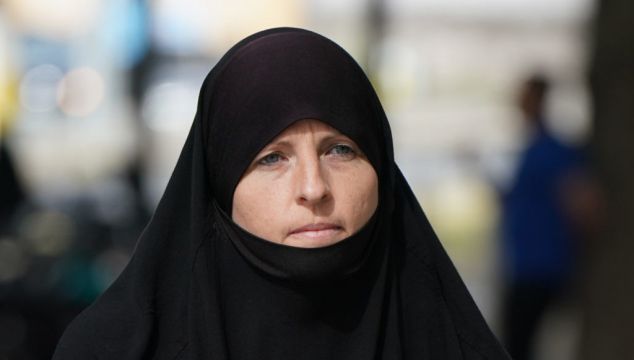Former soldier Lisa Smith is to remain in prison for membership of the terrorist group Islamic State, after a bid to overturn her 15-month sentence was rejected by the Court of Appeal.
Delivering the judgment of the three-judge court on Wednesday morning Mr Justice John Edwards said the judges of the Special Criminal Court who tried, convicted and sentenced Smith had shown "scrupulous fairness and appropriate regard to the evidence".
The court dismissed all grounds of appeal relating to the sentence. Following the judgment Ms Smith's lawyers indicated that they want to appeal her conviction as soon as possible. Her case will be mentioned again on March 24th.
With ordinary remission on her 15-month sentence and taking into account one month she spent in custody on her return to Ireland in 2019, the 41-year-old mother-of-one is due for release on May 27th.
First person convicted
Last year Smith became the first person to be convicted in an Irish court of an Islamic terrorist offence committed abroad when the three-judge, non-jury Special Criminal Court found that she joined Isis when she travelled to Syria in 2015. The 41-year-old from Dundalk, Co Louth had pleaded not guilty to membership of an unlawful terrorist group, Islamic State, between October 28th, 2015 and December 1st, 2019.
Sentencing her to 15 months in prison, Mr Justice Tony Hunt noted that while Smith is a low risk for re-offending, she was persistent and determined in her efforts to travel to Syria and join Isis and has shown no remorse for her actions.
He said it was "serious" for an Irish citizen to take up allegiance with a terrorist organisation and persist with it.
He added that "she may have been easily led by circumstances and other people" but she had also shown resilience and determination to join and remain with Isis "to the bitter end".
She had rejected her family and one of her husbands, who refused to swear allegiance to Isis, and had aligned herself with terrorists such as John Georgelas, an American Isis fighter and propagandist who was killed during fighting in Syria. He said that a custodial sentence was necessary to mark the seriousness of the offence and to deter others from offering support to dangerous organisations.
Isis
During garda interviews, Smith accepted that she travelled to Isis-controlled Syria in 2015 but denied that she had ever joined Isis or any other group. She said she believed she had a religious obligation to live inside the Islamic State created by terrorist leader Abu Bakr al-Baghdadi. Mr Justice Hunt, delivering the court's verdict, said that she went to Syria with her "eyes wide open" having watched videos of Isis atrocities and having taken part in online discussions about Isis with jihadis from Germany, Australia, America and parts of the Middle East.
Appealing the sentence last October, Michael O'Higgins SC, for Smith, told the three-judge court that his client went to ISIS-controlled Syria "got married, kept house and that's it." He said she went out of a religious conviction, "did not contribute to any state-building exercise and did no positive act in favour of Isis."
He added: "There is nothing [in the evidence] beyond that she kept house for a man who did not even regard her as a person."
Mr O'Higgins said that the Special Criminal Court, which convicted and sentenced Smith, did not give enough regard to the mitigating factors, including that Smith is a mother of a young child. He said that the court had incorrectly placed her offending at the higher end of the lower level for membership of a terrorist organisation. Her offending and involvement with Isis, Mr O'Higgins said, could not have been at a lower level than it was.
Detention camps
Mr O'Higgins also said that in sentencing, the Special Criminal Court should have taken into account the nine-and-a-half months Smith spent in two detention camps in Syria. He said the conditions in those camps were appalling; she was locked up "day and night" in a place where people held extreme views and where murder "routinely happens".
The camp was policed by "women who are vicious, looking out for anything that indicates dissidence," he said. Despite the risks to her, Smith spoke out against Isis when Professor Anne Speckhard, an expert in violent extremism, came looking to interview those in the camps. The interview she gave was broadcast with Smith's face pixelated but Smith agreed to have the pixelation removed once she had returned to Ireland. Mr O'Higgins said the court also failed to adequately consider the report written by Professor Speckhard who said that Smith had sincerely denounced Isis and did not support Isis atrocities.
He said that Smith was convicted on the basis that she submitted to the jurisdiction of Islamic State, adding that you could criminalise an entire nation on the same basis but that such offences would have to be considered at the lowest possible level of membership.

Sean Gillane SC, for the Director of Public Prosecutions, said that Isis was a terrorist organisation of "some notoriety which carried out acts of almost historically unprecedented bloodiness." Smith knew of its "bloodlust", counsel said, and discussed Isis atrocities with others in online conversations. He added: "The very essence of the terror was known to her, discussed by her and in some situations explicitly approbated by her."
Smith also knew that Abu Bakr al-Baghdadi, the leader of Isis, had been denounced by Islamic academics all over the world but she still chose to travel to Syria. She rejected every entreaty not to go, counsel said, and when in Syria she rejected every call to return.
She rejected her own husband who asked her not to go and divorced him when he refused to pledge allegiance to al-Baghdadi, Mr Gillane said.
Counsel said the headline sentence of two years and six months set by the Special Criminal Court was appropriate. The reduction from the headline to 15 months, he said, showed that the court did take into account mitigating factors including the hardship she had endured in the detention camps in Syria.







